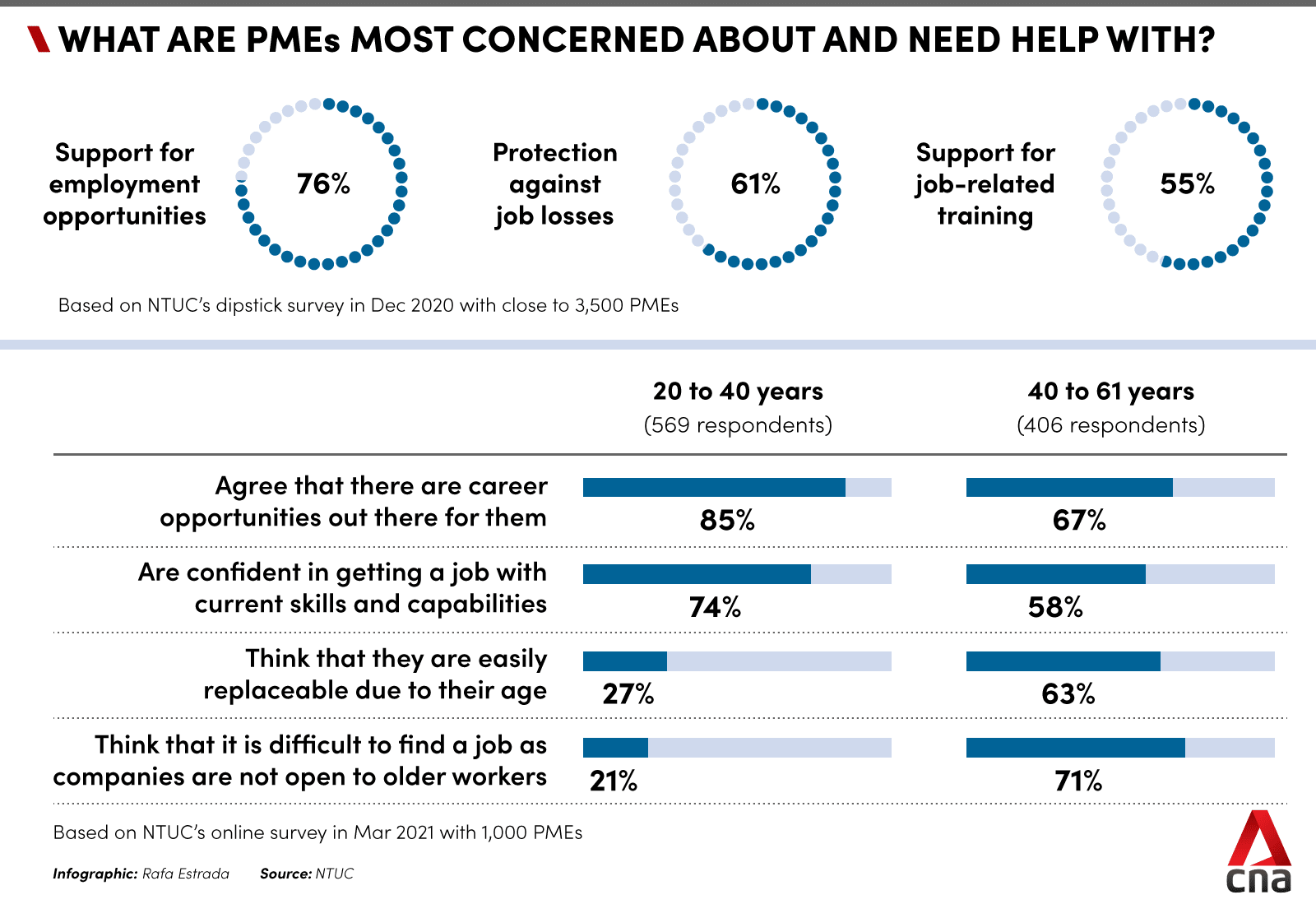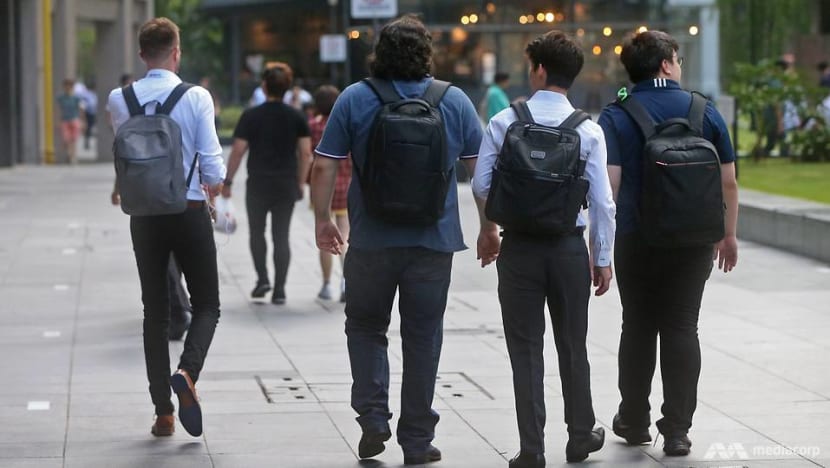IN FOCUS: Qualified, willing but still looking for work - why some mature PMEs struggle to find jobs despite retraining, government support
Is there ageism in the workplace and hiring process? PME jobseekers tell CNA about the stumbling blocks they meet when they look for work at age 40 and above.

Office workers in the financial district of Raffles Place on Sep 6, 2021. (File photo: CNA/Gaya Chandramohan)
SINGAPORE: A former managing director, Siva has been looking for a job for seven years ever since he was retrenched at age 52.
The Singaporean mechanical engineer was one of the applicants who turned up at a job fair at Kampung Admiralty on Oct 26 to try his luck.
He has more than 30 years of experience in oil field drilling equipment manufacturing and seven years ago, his salary as a managing director was about S$10,000. But he was let go in 2014 after oil prices collapsed, he said.
Siva, who did not wish to share his full name, has attended courses in project management and information technology but when he applied for IT jobs, he was told that he did not have the relevant experience.
Recently, he interviewed for an operations role at a public transport company. He was told that he was too highly qualified, even though he was willing to accept an entry-level position and pay of about S$3,000, he said. He feels that his age is a factor.
“Wherever I go interview, they say: ‘You are highly qualified.’ And maybe they will ask one question: ‘What is your age?’” he said.
“Today also the same question: ‘What is your age?’ Then I say I'm 59 (and) maybe my interview will last for less than two minutes.”
His eyes reddened as he recounted how he struggled to find work. When asked if he had considered becoming a private-hire driver, he asked: “Where can I go to apply for that?”
CHALLENGES MATURE PMES FACE
It can be a challenge to find a full-time job when one is made redundant at middle-age, interviewees told CNA.
A task force looking at the employability and employment of Professionals, Managers and Executives (PMEs) released a report on Oct 21 compiling the views of about 10,000 PMEs gathered over a year via online surveys, focus group discussions and engagement sessions.
The report said that compared to younger workers, more mature PMEs seemed less confident about career opportunities. In an online survey conducted in July on 1,000 mature PMEs, a majority of them said they faced challenges in their job search and pointed to their age as the key reason.
Half of them said that they had faced some form of discrimination during the job search or at their workplaces; and some felt that companies are not open to hiring workers who are above 40, the report by the National Trades Union Congress (NTUC) and Singapore National Employers Federation (SNEF) PME Taskforce said.

The report added that many experienced PMEs become self-employed consultants or trainers, or accepted significant pay cuts to stay employed.
These PMEs also face heavier financial obligations with elderly parents and school-going children to support, on top of mortgages, loans and other bills, including healthcare costs.
They are therefore in a “particularly precarious” situation when retrenched, it said.
NO JOBS DESPITE RETRAINING
While the Government has many retraining programmes, some mature PMEs said that they were unable to find work even though they were willing to retrain or had attended courses to gain new skills.
Mr Helmy Osman, 50, left the corporate world to set up an events company in 2019. Then COVID-19 hit, and he had to start looking for a new job as business dried up.
He got a contract position as a customer service adviser in October, but the pay is less than a quarter of what he used to get as a senior executive or running his own business.
And this came only after more than a year of searching for employment and sending out more than 50 applications.
Due to his age, he felt that interviewers were not convinced that he was digitally savvy, even when he said he had a Tik Tok account and had gone for courses to brush up his digital skills.
Related:
Mr Osman did a five-month digital marketing course and also took a data analytics course for about half a year. He also has a Workforce Skills Qualifications diploma in digital, retail and e-commerce.
He said that when he applied for a more junior executive position in a new industry, he was told he was overqualified, but when he goes for managerial roles, he was told he didn’t have the relevant experience.
“I'm embracing what the Government wants - to take up all my courses, which I did. But I don't have someone who wants to give me the opportunity,” he said.
The Tripartite Alliance for Fair and Progressive Employment Practices (TAFEP) said in its FY20/21 annual report that the top two issues it handled, from Apr 1, 2020 to Mar 31, 2021, were fair consideration for Singaporeans (one in three cases) and age (one in eight cases).
Responding to CNA queries, a TAFEP spokesperson advised employees and jobseekers who have encountered workplace discrimination to contact TAFEP for assistance.
The spokesperson added that TAFEP has stepped up employer engagement and education efforts to ensure employers understand their obligations and to help them build age-friendly workplaces.
SWITCH INDUSTRY?
Three other interviewees between 47 and 60 related how they tried to switch to other industries, even at entry levels, but found it difficult and impractical.
The pressure of living costs and familial responsibilities as well as worries about the adequacy of retirement funds were added stressors, leading them to either rejoin their former industry or strike out on their own.
Mr Julian Ang, 47, returned to Singapore from Canada about a year ago. He was working in aircraft maintenance but lost his job when airline traffic plummeted due to the pandemic.
With the airline industry in the doldrums, the degree holder, who also has an Aircraft Maintenance Engineers Technology diploma from Canada which is not recognised here, decided to try other areas of work.
He told CNA that he was keen to get on the Career Conversion Programme (CCP) but was rejected when he applied for the Singapore Institute of Technology’s (SIT) Physiotherapy programme under the CCP.
He then appealed through his Member of Parliament but the appeal failed.
The rejection letter, seen by CNA, states that competition for the programme was stiff and that Mr Ang should “seek relevant full-time work experience of one to two years in the related healthcare sector”, before applying again.
CNA understands that for certain courses under the CCP, particularly in healthcare, applicants with some work experience stand a higher chance of getting onto the course - after which they can get CCP grants to pursue their studies.
But given that the CCP is for people who want to switch to a new sector, Mr Ang felt disappointed.
He added he was willing to be retrained and bonded to a healthcare institution even at his age, but his experience “doesn’t match” what the Government programmes seem to promise, which made his job search all the more frustrating.
“It's very difficult because people either think you're too old, you cost too much; or if you try to look for something a lot ‘lower’, people think: ‘Is there something wrong with you?’” he said.
In the meantime, he is freelancing as a personal trainer, and wants to take a step back from active jobseeking.
HELP IS AVAILABLE: WSG
Many mature PMEs, like Mr Siva, are already being helped by Workforce Singapore (WSG) and NTUC’s Employment and Employability Institute, e2i.
WSG, which reviewed the help Mr Siva has received and shared it with CNA with his permission, said that he approached the agency for employment assistance four times - in April 2015, March 2016 and then twice this year.
In 2015, an e2i career coach worked with Mr Siva then to enhance his job search skills, in areas such as reviewing and improving his resume, and referring him to a career workshop.
When he approached WSG again in 2016, he received personalised career coaching for about a year with job referrals to companies in sectors related to Mr Siva’s interest and experience in Engineering/QA-related jobs, said WSG.
“Mr Siva also shared at the time that he had expected remuneration on par with his last drawn salary. Mr Siva then requested WSG to cease employment assistance in 2017,” said a WSG spokesperson.
Responding to this, Mr Siva told CNA that his pay expectations were higher at first, but not necessarily “on par” with his last salary. He’s since lowered his salary expectations but still wants to be in work that can utilise his skills and qualifications, he said.

This year, Mr Siva went back to e2i and WSG asking for career assistance. WSG said that he had been doing freelance work in QA-related roles in the intervening period, but was now looking for a full-time role again.
Since then, an e2i coach has been working with Mr Siva to enhance his job search skills.
“WSG and e2i are committed to supporting Mr Siva in his job search journey until he secures a job or no longer requires employment assistance. We empathise with his situation and encourage him to allow his coach to continue supporting him in this journey,” the WSG spokesperson said.
The agency added that job-matching efforts by e2i and WSG intensified last year, with 34,000 jobseekers receiving customised career coaching. This was a 15 per cent increase over 2019. Of the 34,000, about two-thirds were PMETs.
On average, about six in 10 jobseekers who received customised career coaching found jobs within six months, while others required more time, said WSG.
“CAN YOU JUGGLE BOTH WORK AND YOUR KIDS?”
Ms Jayasree Balakrishnan Pillai is one jobseeker who eventually found a job despite initial challenges.
The 40-year-old took a two-year break to care for her three young children from 2018 to 2020 and started looking for a job again in June last year.
She sent out more than 100 job applications but got very few responses despite fitting the job requirements in the job advertisements, she said. And she put this down to her age, as well as the fact that she has children, while the pandemic and the sluggish economy were other hurdles.
She recounted that when she did land an interview, she was asked “personal” questions about her family commitments and some expected her to take a pay cut after her two-year hiatus.
“Me being out of workforce for a number of years came across as a big disadvantage to employers,” she said.
“Whenever I go for an interview ... one of the first questions they asked me were … can you juggle both work and your kids? Why are you now intending to come back?”
After consulting a WSG career coach, Ms Jayasree tweaked her resume so that it was more “discoverable” by AI, which many companies now use to weed out job applicants. Interview offers picked up after that, she told CNA.
She is now an accountant with Viki Rakuten and was given an increment from her last job.
Ms Jayasree said that she felt at first that her years of experience were being dismissed by employers, who may have discriminated against her due to her age “compounded” by the fact that she is a mother.
“There's a need to educate them … I feel that employers need to be open to people from any kind of walks of life. Why should our knowledge be discounted just because I was away from work for two years?”
TACKLING AGE DISCRIMINATION
So what can companies do? Ms Linda Teo, country manager of ManpowerGroup said that on a company-level, changing mindsets towards hiring of mature employees needs to start from the top.
If the company’s top leaders have entrenched ageist mindsets, this sentiment will pass on to the rest of the company. Companies also need to recognise that the hiring of mature workers, especially those who’ve been through upskilling programs, is part of the national effort.
“Employers need to emphasise this as they reiterate their stance on fair hiring to their hiring managers,” she said.
She added that they can also review their application process and determine at what points do bias come into play. For instance, they can stop collecting information that may play into biases in the early stages of the hiring process, such as the candidate’s age, NRIC and last drawn salary, to ensure applicants are fairly considered based on their skills.
“With global talent shortage levels at a record high, it is not sustainable to practice age discrimination in hiring in the long run,” she said.
Mr Neil Jones, regional managing director of APAC at recruitment firm AMS, said that there may be more “subconscious bias” when workers in certain sectors are above the age of 50.
“Attitudes may also be influenced by industry norms, with the new crop of up-and-coming digital companies targeting the younger, more digitally-savvy demographic versus traditional bricks-and-mortar companies in mature industries.”
CAREER COACH: WE CAN GIVE ADVICE, BE “LISTENING EAR”
Ultimately, the search for a new job may depend on embracing all the opportunities and support which are available.
Mr Jason Low, principal career coach (lead) at WSG, said that mature workers are an asset to a company given their wealth of experience, knowledge and transferable skills that they can bring to each role.
“It is never too late to learn something new. Embrace new learning methods and never be shy in learning from the people around you (even if they are many years younger),” he said in an email reply to CNA.
“While doing so, you may gain a new perspective about things. Keep an open mind about learning to maintain a growth mindset.”
He asked these job seekers to “review” their assumptions about age as a barrier to landing a job and focus on what they can do to change how others perceive them.
The coach, who has consulted with more than 1,600 clients in the last 10 years, said that the journey is different for each individual, but they should persevere and keep an open mind.
“It is not an easy process, especially during a time like this. It can be frustrating and emotionally draining. There are times when one may become distressed when their job search takes longer than expected.
“Beyond just coaching, career coaches are trained to provide a listening ear, and to be a sounding board, a cheerleader and a pacer,” said Mr Low.
Ms Teo said that they should learn to market themselves and craft their resumes strategically to avoid mentioning their age and last drawn salary while highlighting the transferable skills that they’ve acquired from their past jobs, which can give them an edge over the younger applicants.
“PMEs need to be deliberate in their career choices and play an active role in charting their own career paths. … They need to recognise that there is no job security regardless of their age and think of how best to achieve career security instead,” she advised.
“While waiting for the right opportunity to come by, individuals need to be patient and work on developing themselves so that they will be ready when the time comes.”





















